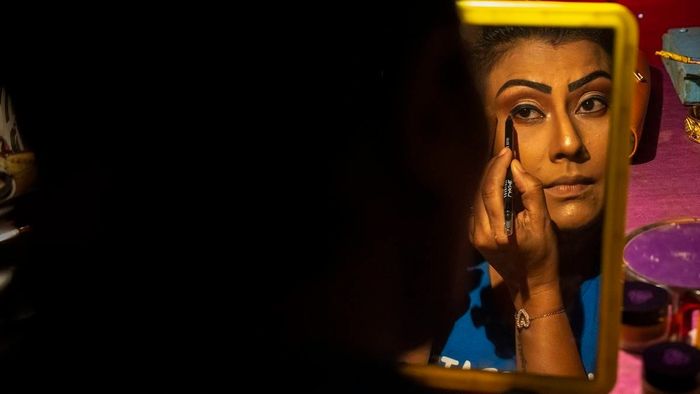Leading ladies under the tent: The rise of women in Assam's mobile theatre
Women are reshaping Assam's mobile theatre by taking on leading roles and telling powerful, socially relevant stories. This change highlights growing female visibility and empowerment in Assamese culture.

- Aug 11, 2025,
- Updated Aug 11, 2025, 8:22 PM IST
In the vivid landscape of Assam's cultural tradition, mobile theatre or bhramyaman theatre, has long been a revered art form, reaching the remotest corners of the state. These travelling troupes bring cinema-like experiences to village fields and small towns with impressive stagecraft, lighting, and acting. While the male actors once monopolized the spotlight and the scripts, there has been a remarkable shift over the decades: women have moved from playing mere supporting roles to becoming the leading forces on and off the stage.
In earlier decades, women in mobile theatres were confined to playing stereotypical roles as dutiful mothers, obedient sisters, sacrificial lovers. Their presence, while often emotional, existed only in relation to the male protagonist. Sometimes, due to social taboos or restrictions, female characters were portrayed by men. The idea of a woman leading a mobile theatre production was nearly unthinkable.
This narrative began to shift in the 1960s when Anupama Bhattacharjya broke barriers by becoming the first female performer in Assam's mobile theatre scene. Her debut with Nataraj Theatre in 1963 was not just groundbreaking, it was historic. Her performances were met with awe and admiration, and more importantly, acceptance. Bhattacharjya's success proved that audiences were ready to embrace female performers in powerful roles.
Her courage paved the way for many more women to follow, steadily challenging patriarchal perceptions and creating space for female talent in the mobile theatre ecosystem.
Among the torchbearers of this transformation is Prastuti Porasor, a leading name in Assamese cinema and mobile theatre. More than just an actress, she is also a producer who heads Awahan Theatre, a renowned mobile troupe. Porasor has not only performed some of the most powerful roles written for the stage but also taken bold decisions about the kind of stories Awahan tells.
Her decision to combine acting with entrepreneurship marked a milestone in the theatre's evolution. By choosing socially conscious and women-led narratives, she has contributed to changing the very language of Assamese theatre, both visually and thematically.
In an interview, Porasor once stated that being a woman in a leadership position in the mobile theatre circuit came with challenges, but it was important to "tell stories from a woman's point of view" and "be at the table where decisions are made."
Another name that gained popularity in recent years is Nandini Kashyap, who had been making waves with her powerful performances and growing presence in mobile theatre. Unfortunately, in mid-2025, her career took a sudden pause following a reported road accident that compelled her to step back from her commitments.
This unexpected turn led to her replacement by rising actress Debashree Das, who was brought in as her substitute in the same theatre company. Though new to the scene, Debashree quickly won over audiences with her mature portrayals and stage presence, showcasing the industry's growing bench of capable female performers.
Names like Barsha Rani Bishaya and Jupitora Bhuyan, who have earned fame in Assamese cinema, have also contributed to mobile theatre through special performances or seasonal stints. Their popularity has helped attract younger and more diverse audiences to this traditional art form, bridging the gap between urban cinema and rural theatre.
Barsha Rani Bishaya is known for her fearless roles and has often portrayed independent, strong-willed characters that break free from the mould of the "ideal woman." Jupitora Bhuyan, too, has garnered praise for her expressive range and subtle performances, especially in roles that deal with emotional and moral complexities.
With women taking centre stage not just as performers but also as decision-makers, the kinds of stories being told in mobile theatre are evolving. Themes of gender equality, women's rights, domestic abuse, and empowerment are now frequent and well-received. Theatre troupes are increasingly writing stories with nuanced female characters, flawed, fierce, funny, and free.
This change is not just artistic, it's cultural. Mobile theatre has always reflected the concerns and values of Assamese society. The rising representation of women on stage and in leadership, signals a deeper societal shift where women are not only seen but also heard.
As Assam's mobile theatre continues to thrive, even in the face of digital media's expansion, the women of the stage are ensuring it doesn't just survive, it transforms. With each season, with every play, they are scripting not just drama but history.